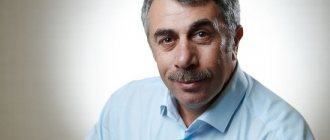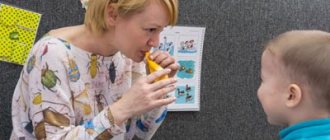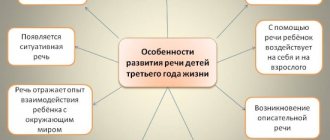Speech development specialists do not give clear deadlines for when a child should speak at 2 years old. There are only approximate guidelines for standards that parents and teachers can rely on. Parents' concerns are understandable. However, if a child does not speak at 2 years old, Komarovsky believes that this is not a reason to diagnose him and is unnecessarily worried.
Norms of speech development in children
Speech development occurs gradually. Each child is individual, so he can either be ahead of age norms or a little behind. Girls are thought to start talking earlier than boys, and parents of boys don't always know whether to worry or just wait. The reason is physiological characteristics: the maturation of some brain structures in girls occurs faster. Because of this, they develop better vocabulary at an early age. But not only the number of words, but also other signs are important for assessing a child’s speech development. They are universal for both boys and girls.
The speed and quality of speech development in children is individual, and normative boundaries are arbitrary. Your pediatrician will help you understand that everything is fine with your baby. To make a preliminary assessment of speech development, you can focus on the norms described by the Soviet psychologist Lev Semenovich Vygotsky [1].
Up to a year
In the first months of life, the baby listens to his parents and the adults around him. He distinguishes the voices of people talking to him and turns his head towards the sound. First, the child masters vowel sounds, then by three to four months, consonant sounds appear, and the baby begins to roar.
At the age of 6–12 months, the child more actively imitates the sounds of adult speech. Babbling appears - the baby pronounces the same syllables, for example “ma-ma-ma”, “pa-pa-pa”, “dya-dya-dya”. At about ten months, children get used to responding to their name. By the age of one year, the child appears the first short meaningful words (“na”, “give”, “mom”). Vocabulary ranges from 3 to 20 words. In addition, a child of this age correctly responds to requests to show or give something (does it or shakes his head negatively).
From one year to two years
At one year old, the baby repeats words that he often hears, and adjectives appear in his speech. The child uses sounds and gestures to attract attention, skips or replaces complex combinations of sounds, adapting speech to himself, for example: “bad - groin.” The baby moves more, begins to move independently and accumulates knowledge about the world around him. The vocabulary is actively replenished: up to one and a half years, a child uses 30-40 words, closer to two years - 300-400. In girls, by the age of one and a half years, in boys, by the age of two, phrasal speech begins to form. It arises and is primarily used to ask questions and express simple needs (“Give me something to drink”).
From two to three years
At this age, the ability to speak in sentences of 2–3 words is actively developing. The child begins to use pronouns and prepositions. His speech becomes more understandable to adults, and he can fulfill their two-part requests, for example: “Take your toy and give it to me.” The vocabulary is replenished by 100 words per month. At two or two and a half years old, the baby asks questions: “Why?”, “Where?” and so on.
Three years
At three years old, the child actively communicates with adults and peers using simple sentences. He can explain his desires in words. The baby begins to use conjunctions and uses almost all the main parts of speech, including using generalized names (“animals”, “things”, etc.). In this case, the child may still pronounce sounds unclearly. The baby likes to listen to familiar fairy tales and poems. He remembers the text well and reproduces it. The vocabulary is updated every day [2].
Eliminate baby talk
Despite the temptation, try not to babysit your child. Speak in simple language, but in normal words, as with an adult - you don’t know when the baby will begin to understand your words, this may happen unexpectedly early. Thanks to your conversations, the baby masters the basic units of language and the laws of their functioning.
Source: Shutterstock
How to help your child talk
When children begin to speak their first words, they really like it. The main way to help your child speak is to communicate with him as often as possible. In infancy, the baby understands speech on an emotional level, so you need to speak expressively to him. All actions associated with it - bathing, massage, feeding, etc. – accompany with emotionally charged words. Call the baby by name, pronounce the names of things, talk about what the child himself does and how well he does it, and also pick up and repeat all the sounds that he makes.
As they get older, it is better to use short and clear sentences so that the child can observe the movement of the lips and apply the knowledge in his speech. You need to maintain a conversation with your baby, ask him questions and try to have a long conversation.
Read books and sing songs.
You can read a book to your child and show the characters in the pictures. They will attract his attention, and auditory perception will help him remember new words. Learning new songs and short rhymes together develops the speech apparatus and also strengthens the bond with the baby.
Develop fine motor skills.
Fine motor skills are the performance of small movements with the hands, fingers and toes, for example: picking through cereals, playing with beads and buttons.
The brain centers responsible for motor skills and speech are located next to each other, so when motor skills are stimulated, speech development occurs faster. Note to moms and dads:
FrutoNyanya produces puree in packets that are covered with fruit lids. Each fruit cap is an element of a developmental construction set from which you can assemble many figures. We had some food and played! Try games to develop fine motor skills with fruit caps, and also watch Video: Development of gross and fine motor skills
Develop vocabulary.
You can show and name surrounding objects to your child: at home, in the park, at a party. The meaning of objects should be explained in simple language. This way the child will expand his knowledge of the world around him, learn new words and learn to speak faster.
Refuse sign language and distortion of words.
It is better for adults to stop mangling words, because a child learns to speak based on the speech he hears around him. If the baby replaces words with gestures, you can pretend that they are incomprehensible. This will encourage him to speak. You should not make your child cry or become hysterical. You should act gently - ask leading questions, pronounce words one after another.
Etiology of the absence of speech function according to Komarovsky
Dr. Komarovsky, in addition to the main causes of delayed speech development, identifies others. The main problem for modern parents is increased attention to speech development. If the child does not start speaking before the age of 2, the relatives are very worried, nervous, and take the child to a speech therapist, neurologist, or otolaryngologist. Such increased attention forces the child, on the contrary, to continue to remain silent.
Many parents rush their baby to talk. They begin to study it intensively, which reduces the speed of speech development. The child wants to play, but he is forced to sit over books, drawings, cards. Children at 1.5 years of age experience difficulties with attention, so they quickly get bored with activities. Tasks that are not appropriate for age, prolonged sitting only repel the preschooler from studying. He may refuse to talk at all.
Komarovsky often talks about a modern problem - gadgets. Parents do not want to work with their child. They devote more time to the computer, tablet, and TV.
Relatives early teach the child to play games on a tablet, use phones, watch cartoons, and read few books. Games and animation do not allow speech and imagination to develop. It is especially harmful to let a preschooler over 1.5 years old use gadgets. At this time, there is a surge in speech development. If you miss the early period of formation of speech function, the child will be severely delayed.
The next problem, according to Komarovsky, is the high employment of adults. Parents living in cities are constantly at work. Some of them work until late. On weekends, city residents try to relax: go to clubs, restaurants, go fishing, go shopping, watch TV, go to the gym. For this reason, the child does not have time to communicate with relatives. He is either with a nanny or in kindergarten, and this is not enough for full speech development. A preschooler may protest and become completely silent.
One of the reasons for silence is the lack of motivation to speak on the part of parents. If a preschooler is silent, this does not always mean that he cannot speak. The child was not motivated by his parents to develop speech. He responds adequately to requests and tasks without using speech, so he sees no point in mastering speech skills. The baby often simply hums, nods, or points to an object or relative.
Games for the development of the articulatory apparatus
Music games
help the child develop speech breathing and provide the opportunity to develop drawn-out pronunciation of vowel sounds and clear pronunciation of consonant sounds. The following activities may help:
- songs with repetition of syllables, for example: “Pee-pee-pee-pee-food! And only then - sleep-pee-food”;
- toys that reproduce animal sounds - they are worth repeating together;
- musical instruments in the game: you need to ask the child to say the name of the instrument and repeat the sounds it makes.
Finger games are the depiction of some rhymes or stories using your fingers. Such activities help to quickly engage the speech center. Finger games use various hand movements - raising and lowering your palms, clapping your hands, as well as bending and straightening your fingers. “Okay, okay” and “The geese were flying,” familiar to everyone from childhood, are perfect for such exercises. More examples of finger games in the article.
Articulation gymnastics
aimed at developing the mobility of the speech organs. It includes exercises for the tongue, cheeks, lips and facial exercises. The following activities are suitable:
- Grimaces: standing together in front of a mirror, smile broadly, stick out your tongue, puff out your cheeks.
- Simple breathing games: blow a candy wrapper off your palm, blow soap bubbles, blow on a dandelion.
- Games with the tongue: hide and show the tongue, make circular movements with the tongue like the hand of a clock, try to reach the tip of the nose with the tongue.
Grammatical structure of speech and sound pronunciation
After one and a half years, the ability to change words in the simplest ways appears, linking them into one phrase (give me a doll - “give me a ku”). Monosyllabic sentences are most often used. In such primitive sentences, one word can be used in different meanings. By pronouncing the word “mu,” in one case the child wants to be given a toy, and in another, with the same word, he draws the adult’s attention to the eyes or horns of the toy cow that he is holding in his hands.
By the end of the second year of life, sentences may contain three or four words. Sentences can be both interrogative and exclamatory. The question words themselves are not yet available to the child; he expresses the question by the intonation with which he pronounces such a sentence. There are no prepositions in the words yet either (“Seva bi-bi” - Seva has a typewriter).
All vowel sounds are already pronounced by the baby in the second year of life. Its articulations and some consonant sounds are available: m, p, k, t, d, n, f, x, b, g, v, y. The clarity of their pronunciation depends on the place of the sound in the word and the number of syllables in it. In simple words of one or two syllables, all sounds are pronounced correctly (Katya, dad, Tanya, Vova). These same sounds are “swallowed” and distorted in more complex words (pisina - machine). Combinations of two consonant sounds next to each other (heb - bread) are also difficult for the baby, especially if these are sounds that are difficult to pronounce, for example: s, sh, r, l.
Different rates of speech acquisition by children of the same age become noticeable. This depends on the individual characteristics of the baby, heredity, and diseases suffered in early childhood. Of great importance is the intensity of communication between adults and the child, how the child’s speech development is stimulated at 1 year of age.
When to see a doctor
Speech development for each child occurs individually, and it does not matter at what age or how many months mom or dad started speaking. In order to detect delays in a timely manner, you need to undergo regular scheduled examinations with a pediatrician.
If during your next appointment the doctor reveals signs of a speech disorder, you should contact a neurologist and speech therapist. Specialists will draw up a correction plan. It is important that parents actively participate in the treatment process and provide support to the child - the effect of the classes will depend on this.
A child does not speak at 3 years old: what to do?
All parents who are faced with the problem of delayed speech development in a child are wondering why he doesn’t say what to do, how to teach, whether it is necessary to force or eliminate pressure, how long it will take. Komarovsky gives some explanations.
Advice from Dr. Komarovsky
Dr. Komarovsky, if a boy or girl has speech problems, strongly recommends contacting qualified specialists:
- ENT. A hardware hearing examination and audiogram will be required. This will determine whether the child has hearing problems.
- Neurologist. It is the presence of neurological pathologies that often causes speech development disorders. It is important to note in a conversation with a doctor when the child began to perceive human speech, at what age the humming began, and what skills are inherent in him at 3 years old.
- Speech therapist. Specialists in this profile can determine the presence of speech apparatus disorders (for example, a short frenulum or poor development of the facial muscles and tongue).
- Psychologist. Perhaps insufficient speech development is due to reasons related to the psychological state.
Dr. Komarovsky identifies the following as the most important steps that parents need to take:
- examination of the child for physical and neurological disorders;
- consultations with a speech therapist and psychologist;
- limiting the long inactive time that the child spends playing with gadgets;
- spending more time communicating with the child;
- frequent use of names of surrounding objects when communicating with a child;
- pronouncing the actions being performed, what will be called.
Important! Under no circumstances should you scold a child for silence. Any child’s attempts to speak should be assessed positively and praised.
When communicating with a child at the age of three, you need to ask him simple open questions - why, why, how, etc.
He should also read children's literature aloud, learn short poems, sayings and nursery rhymes. It is important to encourage the child’s communication with other children in every possible way.
You cannot predict a child's wishes. He must have a need to express his needs and wishes. And his requests need to be clarified.
The child should be protected from additional stress.
Drug treatment
In some cases, if a child has a delay in speech development, doctors prescribe a complex of medications. Such tablets are aimed at improving the nutrition of brain neurons. Due to this, the work of the speech areas of the brain is stimulated. Among the medications used in this case are Cortexin, Cogitum, Neuromultivit and some others.
Important! In no case should drugs be prescribed to a child on their own; this can only be done by a doctor, based on the presence of real indications for such therapy.
Along with taking the medications listed above, another set of measures is usually prescribed:
- microcurrent reflexology;
- light therapy;
- acupuncture;
- massage;
- classes with a specialist in the field of neuropsychology
- summer walk and warm-up in the fresh air.
Frontal speech therapy lesson in the preparatory group
Corrective method
The correctional method involves a set of measures, the purpose of which is to eliminate the child’s speech defects. Relevant activities are carried out by professionals in the field of speech therapy and defectology.
Among such events are:
- Articulation exercise. These are special exercises aimed at ensuring that the child correctly uses the tongue, lips, and lungs when pronouncing sounds.
- Installation of sounds.
- Onomatopoeia.
- Word imitation.
- Logorhythmics is a set of special exercises based on music, movements and words.
Pedagogical methods
This group of methods for correcting speech problems can be used by parents at home. The main aspect of this method is the process of developing fine motor skills.
For your information! Numerous studies have found that movements made with the fingers activate the part of the brain that is responsible for spoken language.
Accordingly, the following actions must be taken with the child:
- exercise your fingers;
- massage the baby's fingers;
- play games related to earbuds;
- exercise with sand and cereals, as well as in water;
- test substances that feel different to the touch;
- organize finger theater and shadow theater;
- sculpt (both clay and plasticine, and dough are suitable).
Other techniques related to the pedagogical method of speech correction are the following:
- staging;
- theatrical performances;
- study of folklore;
- writing stories.
Recommendations for parents
- Talk more with your child, maintain warm emotional contact, ask questions and engage in dialogue.
- Refuse sign language and distortion of words.
- Do not swear, do not get angry and do not force the child to talk.
- Praise your child for his achievements more often.
- Read, sing and do gymnastics with your child.
- Adhere to a playful form, involving the child in the game and arousing interest in it.
- Undergo routine examinations with a doctor and, if problems arise, contact specialists.
List of sources
1. Vygotsky L. S., Psychology of child development, M: Smysl Publishing House, Eksmo Publishing House, 2004. - 512 p. (Series “Library of World Psychology”)
2. Stages of development of a child’s speech and the reason for contacting a specialist, Federal State Budgetary Institution “SZONKTs im. L. G. Sokolova" FMBA of Russia
Mental retardation
This name was given to underdevelopment of mental activity. As a rule, it is provoked by several factors, among which genetic diseases come first. The other group consists of exogenous factors: trauma, intoxication, infection, fetal hypoxia.
Mental retardation is irreversible and is characterized by the following features:
- totality of the lesion - all neuropsychic functions are disrupted. Speech especially suffers - the grammatical side, the active vocabulary is very meager. Emotions are flat, monotonous, little controlled;
- Among mental processes, thinking is the first to suffer. Its deficiency leads to underdevelopment of elementary mental processes: memory, speech, perception.
UI is primarily represented by oligophrenia . This is underdevelopment of the brain associated with irreversible damage to the cerebral cortex. It is a congenital or acquired defect before the age of two.
There are three degrees of oligophrenia:
- debility;
- imbecility;
- idiocy.
They differ in the severity of the intellectual defect. If IQ with debility ranges from 50 to 70, then with idiocy this figure is 20.
Children suffering from debility are capable of simple work. They find it difficult to learn new skills, and their emotions are very primitive. Sensorimotor reactions are slowed. Phrase speech and mechanical memory are preserved. They are able to master basic reading, writing, and counting skills. Debility is the mildest degree of the disorder.
Imbecility preserves the most primitive self-service skills, the ability to remember a small amount of information, and allows one to acquire basic learning skills.
Idiocy is a gross, deep disturbance of thinking (virtually absent) and all mental processes in general. Such children are not capable of self-care and have poor spatial orientation. Almost no one recognizes them except the people caring for them. Behavior is often dictated by instinctive programs. The speech is incomprehensible. Expressions of emotions such as crying and tears are not typical.
Dementia is an acquired dementia that develops in a child after 2-3 years of age, and is accompanied by the collapse of already formed mental functions. Infections or injuries can trigger dementia. The condition is characterized by uneven damage, with some parts of the brain affected more than others.
How does the ZPR transfer to the UO?
Defects in mental activity with a delay in mental retardation tend to transform both towards progress and towards regression. For example, there are cases where a child in an orphanage, as if in a frozen state, does not walk, does not talk, freezes at one point, being adopted by a prosperous family, literally in a week learns all the skills appropriate to his age. He is quickly gaining weight and improving his communication skills.
On the other hand, a slowdown in the rate of development can increase, exacerbating its manifestations. In addition, the term ZPR is applicable only for preschoolers and primary schoolchildren. If, after primary school age, signs of mental retardation persist, then it goes into the category of mental retardation.
The main role in the progression of symptoms of mental retardation is played by untimely or completely ignored measures to correct the condition. It is very important to begin corrective treatment for such children as early as possible. It requires special training. Regular schools cannot create the necessary conditions to accept such children. When time is lost, existing defects deepen on all fronts:
- Cognitive processes - attention, perception, memory - are further distorted, which inevitably leads to a decrease in intellectual activity;
- both written and oral speech do not progress. The child is not able to receive information from the outside in sufficient quantities, which is why he withdraws into himself. Communication ties with the world are severed. Establishing contact with peers and family members becomes almost impossible. Thus, the baby self-isolates and withdraws into himself;
- Due to the regression of cognitive abilities, it is difficult for children with advanced forms of mental retardation to master even basic skills. There is no natural age-related change in activity from play to learning;
- the emotional sphere is deteriorating. The child becomes labile and does not control his emotions.
Relationships with parents, in particular with the mother, play a special role. Feeling irritation, lack of support, and love on her part, kids turn into capricious, touchy and stubborn bullies, or fall into a stupor. The lack of emotional connection gives rise, in addition to personal degradation, to fears and anxiety.
In general, children lose touch with the world around them. In the future, it becomes difficult for them to adapt to the team, decide and get a profession, and establish interpersonal relationships. The advanced stage of mental retardation makes the child infantile, uncontrollable, distracted and helpless, and can lead to traits corresponding to mental retardation.










